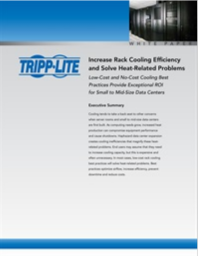Increase Rack Cooling Efficiency and Solve Heat-Related Problems
Low-Cost and No-Cost Cooling Best Practices Provide Exceptional ROI for Small to Mid-Size Data Centers
Cooling tends to take a back seat to other concerns when server rooms and small to mid-size data centers are first built. As computing needs grow, increased heat production can compromise equipment performance and cause shutdowns. Haphazard data center expansion creates cooling inefficiencies that magnify these heatrelated problems. End users may assume that they need to increase cooling capacity, but this is expensive and often unnecessary. In most cases, low-cost rack cooling best practices will solve heat-related problems. Best practices optimize airflow, increase efficiency, prevent downtime and reduce costs.
Download this whitepaper to find out more.
Read More
By submitting this form you agree to Tripp Lite contacting you with marketing-related emails or by telephone. You may unsubscribe at any time. Tripp Lite web sites and communications are subject to their Privacy Notice.
By requesting this resource you agree to our terms of use. All data is protected by our Privacy Notice. If you have any further questions please email dataprotection@techpublishhub.com
Related Categories: Batteries, Components, cooling, Industrial, Power, Switches


More resources from Tripp Lite

Rack Basics: Everything You Need to Know Before You Equip Your Data Center
Racks organize IT equipment, such as servers and network switches, into standardized assemblies that make efficient use of space and other resource...

Introduction to TAA Compliance for Government IT Suppliers, Distributors, Resellers and Contractors
If you supply products for GSA Schedules and other government contracts, those products must comply with the federal Trade Agreements Act (TAA). Fa...

Common Power Problems & Power Protection Solutions
The importance of clean, reliable and continuous power is paramount for the technology we depend on in our everyday lives.
This white paper d...
